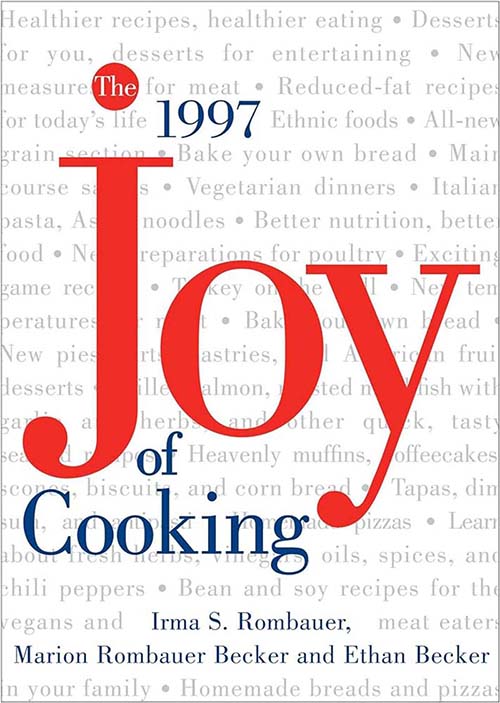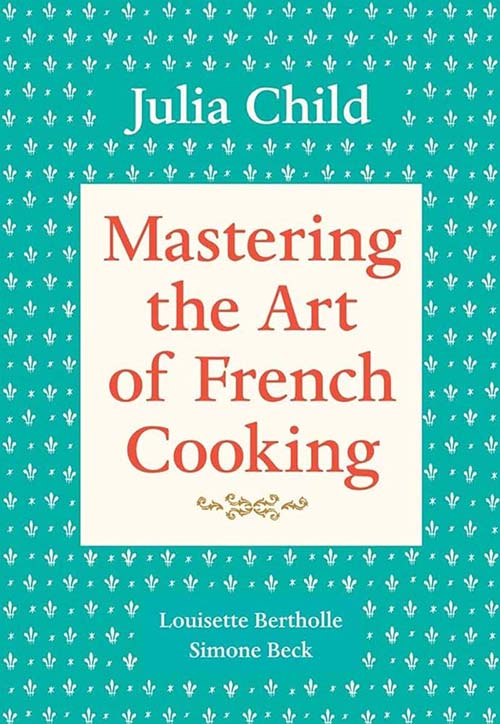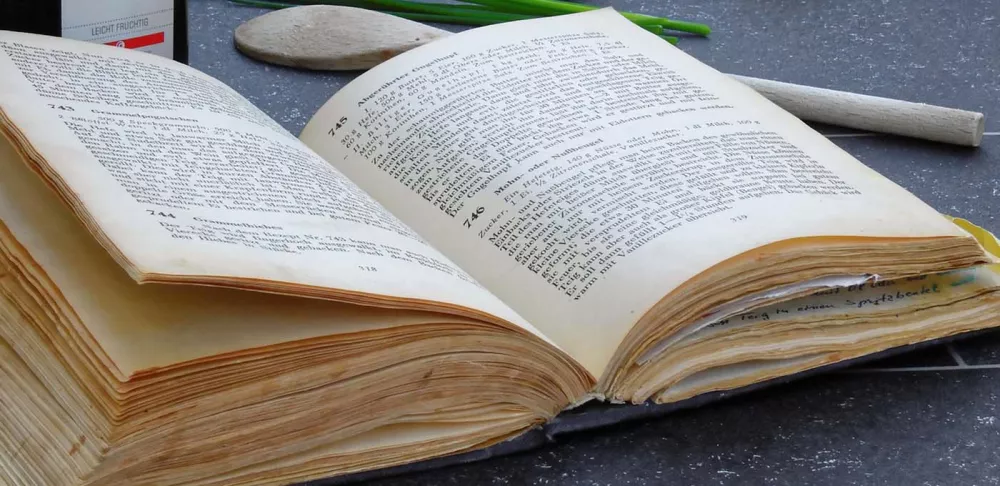In the age of the internet, one might think that cookbooks would have become a relic of the past, however, new cookbooks continue to enter the market on a regular basis.
Plenty of classic cookbooks contain wisdom that even tenured chefs still rely on.
“I think the thing that makes classic cookbooks classic is they are both trend-proof and bullet-proof,” says ICE Los Angeles Campus President Lachlan Sands. “The recipes in them remain popular because they are delicious, culturally relevant and if you follow the directions as written, they work. With the advent of the internet and the opportunity to source from millions of online recipes, professionally tested and functional recipes are hard to identify. Classic cookbooks make it easy.”
Why do professional chefs prefer certain classic cookbooks?
In the digital age, cooking remains stubbornly analog, which is a comfort for those of us who love to do it, and physical cookbooks are also a reminder of that, regardless of changing technology and tastes.
“Many of these books are by the giants upon whose shoulders we stand,” adds ICE Chef-Instructor Stephen Chavez. “I do believe that ingredients, innovations and tastes change, but the technique is forever. There are only seven classic ways to cook: sauté, grill, fry, braise, poach, roast and the rarely used poeler,” he says. “If you can master those techniques, then you can cook anything.”
ICE Chef Ann Ziata adds “Chefs today didn't invent cooking; they learned from the cooks before them. And before the internet, if you wanted to expand your skills beyond family recipes, you had to open a book. When students start culinary school, we take them back to the basics: traditional cooking techniques and classic recipes. Once they have a solid foundation, they can add their own flair and create dishes with dimension and meaning.”
Cookbooks have and will continue to be our partners-in-crime for the cooking process. Their dog-eared corners and sauce-splattered pages are like a diary, reminding us of some of our favorite memories of feeding ourselves and our loved ones. Both recently and historically classic, here are eight cookbooks that chefs still frequently turn to.

“The Joy of Cooking” by Irma S. Rombauer
“The Joy of Cooking” reminds us that cooking can — and should — be a joyful pursuit.
“‘The Joy of Cooking’ is such a solid foundation for understanding everything from grains to soups to breads and desserts,” Chef Ann says. “A great dish is a classic for a reason, and good taste never goes out of style."
Originally published in 1931, The New York Public Library named it one of the 150 most influential books — not just cookbooks — of the 20th century, speaking to its long-lasting relevance. The 75th Anniversary edition, published in 2006, retains the original voice of the author, and there is a joy to be found even in the table of contents, with sections including “Griddle Cakes and Fritter Variations” and “Poultry and Wildfowl.”
Related: Cookbooks Written by Female Chefs
“CookWise: The Hows and Whys of Successful Cooking” by Shirley O. Corriher
Published in 1997, this excellent, scientifically focused cookbook is a favorite of Chef Stephen.
“Along with James Beard, she is one of the major influences on Alton Brown and was seen occasionally on camera in his show ‘Good Eats,’” he says. “She approaches food from a scientific perspective and answers not only how to do something, but why that something happens, and what the science is behind it,” an especially helpful methodology for aspiring chefs.
Cookbooks not only outline the cooking process but can help reignite memories tied to specific dishes and cuisines. Chef Stephen knows this well.
“Years ago, when applying for my first job teaching [at] Le Cordon Bleu, I memorized [Shirley O. Corriher's] information about cooking crème anglaise, and recited it word for word when doing my cooking demo,” he says. “Thankfully, that extra bit of information that I gave to the panel was what put my demo over the top, and I got the job. Here I am still teaching in my twentieth year, and I still reference Shirley and her book today.”
“The Silver Spoon” published by Phaidon Press
Before Marcella Hazan did for Italian cuisine what Julia Childs did for French, this cookbook was on hand to help people learn Italian cuisine.
“‘The Silver Spoon’ cookbook was originally published in 1950 to establish a baseline for classic Italian cooking,” Chef Lachlan says. “Focused on fresh, quality ingredients and authentic regional flavor profiles, this is my favorite cookbook ever. If I could eat from this one every day, I would.”
“The New Best Recipe” by Cook's Illustrated
Chef Lachlan cites this extensive work as one of two cookbooks he finds himself returning to. Authored collectively by Cook's Illustrated, informally considered “America’s Test Kitchen,” the original was published in 1999, with the “New” version published in 2004.
“This encyclopedic work covers just about everything you would ever want to cook with clear directions and dozens and dozens of tests for each recipe,” Chef Lachlan says, “making them both bullet-proof and super tasty.”

“Mastering the Art of French Cooking” by Julia Child, Louisette Bertholle and Simone Beck
Chef Stephen notes that he, of course, has a copy of what became one of the most influential cookbooks of all time. Not only did it inspire home cooks in the 1960s to travel to France via their own kitchens, but it also inspired so much more: the genesis of cooking television, a tribute blog and a major motion picture. So let it continue to inspire you, as well.
Sure, you can look up hundreds, if not thousands, of Boeuf Bourguignon recipes online, but will your process have the well-tested pedigree of this manual, not to mention the appropriate feel without it propped open on the counter, and the quirky falsetto of Julia herself whispering in your ear?
“The Fannie Farmer Cookbook: A Tradition of Good Cooking for a New Generation of Cooks” by Marion Cunningham
ICE Pastry & Baking Arts Chef-Instructor Kathryn Gordon recommends this cookbook with its reassuring title, for its “classic and usually straightforward recipes and a sense of nostalgia.”
Speaking of nostalgia, this is arguably the most classic of the classics, originally published in 1896 as "The Boston Cooking-School Cook Book." A perfect manual for beginners especially, the book includes nearly 2,000 recipes to bring aspiring cooks back to the basics.
“The Voluptuous Vegan” by Myra Kornfeld
While Mollie Katzen’s "Moosewood Cookbook" is long considered the bible for vegetarian cuisine long before “local” and “seasonal” became principles that American cooks dared aspire to, Chef Ann suggests that Myra Kornfeld’s book does the same for vegan cookery.
Published in 2000, “it was ahead of the time for vegan recipes,” Chef Ann says. “If you've been plant-based for a while, you remember how rare it was to find good recipes that weren't just sautéed tofu with carrots. This book opened my world to vegetables I hadn't tried before and techniques that made every meal very gourmet.”
Want to eat more plants? Broaden your horizons in ICE's Plant-Based Culinary Arts program
“Better Homes and Gardens New Cookbook” published by Better Homes & Gardens
It is the red gingham of this book that conjures my own earliest kitchen memories and comforts me with its ongoing commitment to practicality: the category tabs, the helpful introductory sections on measuring and ratios, the photo series that delineate everything from pasta shapes to cuts of beef. And perhaps most importantly, the 3-ring binding, which allowed it to easily lay flat on the counter. (It’s hard to believe that this hasn’t become the industry standard for cookbooks in the years since it was first published in 1965.)
Even though each edition has added new recipes to stay contemporary and relevant, it hasn’t lost sight of its roots, and it’s what I want to reach for when the urge for classic comfort foods like scalloped potatoes or pot roast strikes.
More like this: Essential Cookbooks Written by Black Authors






